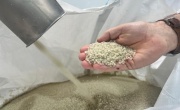Gwynedd to move to three-weekly collections in October

Gwynedd Council’s cabinet has approved plans to collect residual waste on a three-weekly basis from October 2014.
The cabinet met yesterday (29 April) to consider a recommendation to change its residual waste collection from a fortnightly to a three-weekly service.
The recommendation came in a report submitted to the cabinet by ‘independent experts’, that suggested moving to a three-weekly residual waste system could ‘provide a significant boost to the council’s drive to encourage residents to make full use of the convenient weekly recycling and food waste service’, thus helping the council meet the Welsh Government’s target of recycling or composting 58 per cent of household waste by March 2016. If these statutory targets are not met, local authorities will face fines of £200 for every tonne under the threshold.
The cabinet also took into consideration a recent public consultation and Citizen Panel survey in which local residents were asked about their thoughts on the council’s recycling services. It was found that nearly half of residents have ‘no concerns at all’ with proposed changes (however there were concerns revolving around arrangements for collecting ‘smelly waste’, such as nappies).
As such, the council cabinet has unanimoulsy voted to move to three-weekly collections of black bin waste to drive up recycling efforts, making it the second UK council to move to three-weekly waste collections (after Falkirk introduces its new scheme next month).
The changes will be introduced in the Dwyfor area of the county from October 2014, the Meirionnydd area from March 2015 and in Arfon from June 2015.
Whilst residual waste collections will be changed to a three-weekly arrangement, there will be no changes to the weekly recycling and food waste collection services.
‘Changes could save £350,000 per year’
Gwynedd Council’s Environment Cabinet Member, Councillor Gareth Roberts said: “As a council we must now take steps to persuade those residents who continue to throw waste that can be recycled or composted in their residual waste wheelie bin to start using the convenient weekly recycling and food waste services.
“In 2012/13, Gwynedd was within a hair’s breadth of incurring a £123,000 Welsh Government fine for failing to reach national recycling and landfill targets. By acting now and working with local communities, we are confident that we will be able to significantly improve our recycling levels so that we can avoid huge financial penalties, which we simply cannot afford.
“As well as avoiding huge financial penalties, it is also a fact that cuts in government funding mean that Gwynedd Council is facing a funding gap of around £50 million between now and 2017/18 and that implementing these changes now will deliver an annual financial saving of around £350,000 for the council and enable us to avoid painful service cuts elsewhere.”
Gwynedd Council has already implemented a range of service changes to encourage residents to recycling and compost more, including expanding its weekly recycling service offering to include a wider range of plastics, and introducing a weekly food waste service.
Read more about the collection changes in Gwynedd.



